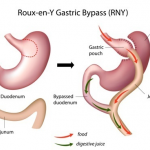Ozempic, a drug indicated for Type II diabetes, has become the latest weight-loss darling. Not since ivermectin has a drug gained so much interest from its off-label uses. Let’s take a deeper look at the science and a regulatory conundrum.
bariatric surgery
Obesity remains a significant health problem, especially when it increases one's susceptibility to COVID-19. While better eating habits and exercise have long been the mainstays of weight reduction, in the last 10-to-15 years surgical rearrangements of the gastrointestinal tract have come to the fore. Not only do they reduce weight, but they've improved hypertension and diabetes mellitus. A new study compares surgical and medical management for diabetes.
Two recent observational studies found that remission from Type 2 diabetes is as easy -- or hard -- as losing a significant amount of weight.
Bariatric surgery is the most effective means of dealing with severe obesity. But there are several types of surgery which involve more, or less, alterations of the gastrointestinal tract. Choosing among them depends on a variety of factors relating to GERD, or gastro-esophageal reflux symptoms.
Someone considering bariatric surgery, specifically the so-called Roux-en-Y procedure, will be glad to know that the benefits are long-lasting, according to a new study. Those who underwent it not only maintained much of their weight loss for at least 12 years, they also were less likely to develop type 2 diabetes than equally-obese people who didn't have that surgery.
While bariatric surgery is the most effective means of dealing with extreme obesity, subjects must still exercise some degree of dietary discipline to obtain the most benefit. A new analysis finds that the degree of early weight loss predicts long-term success, and both are linked to decreases in energy intake.
Not only does bariatric surgery provide substantial weight loss to the obese, but it can also ameliorate the metabolic derangements of diabetes and decrease their need for medications. And, a new randomized study found, these beneficial results aren't transient — they were still apparent five years post-surgery and were superior to the results of strictly medical treatment.
It used to be that Type 2 diabetes was typically seen in people over 40. But with the obesity epidemic, the age of onset is often lower. A recent study found that bariatric surgery was more effective for both weight loss and remission of the disease in those whose disease had an earlier onset. It provides a good reason not to delay surgery.
Bariatric, or weight loss, surgery works. A severely obese person might lose 50 percent of his or her excess body fat in the first year after such surgery. One question that has lingered for decades is: How long do such effects last? Another is: Do people gain back the weight that they've lost and, if so, how quickly does that happen?
If someone has been obese for many years, would undergoing bariatric surgery still be helpful, allowing them to live longer? A recent study shows that while middle-aged patients benefitted, "bypass surgery is protective against mortality even for older patients."
Bariatric surgery is currently the most effective means of weight loss for the extremely obese; some types have even been shown to cause remission of diabetes. But these benefits occur with some downsides, which people should be aware of before choosing this type of treatment.
Bariatric surgery is probably the most effective means of dealing with obesity, and with obesity-linked Type 2 diabetes as well. Some questions remain like, how long do benefits last and who should be eligible for this treatment? A couple of new reports shed some light.








